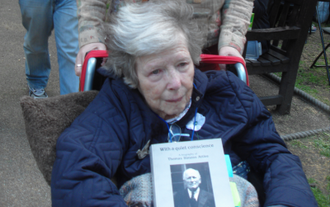Peggy Attlee: Lifelong peace campaigner

The funeral of Peggy Atlee took place at St Thomas More Church, Swiss Cottage London on 17 April 2018. Valerie Flessati gave this address during the service.
Not long after she moved back to London from Cornwall - so around 1977 - Peggy answered an advertisement in the parish newsletter of St Dominic's Parish in Haverstock Hill, London. Pax Christi, the international Catholic peace movement, was based at the priory and we needed help.
Pax Christi's blend of faith and politics matched Peggy's lifelong interests and she soon became an indispensable member of the office team, volunteering two days a week and involved in every aspect of its life. Our small organisation gave plenty of scope to her tremendous gifts, her competence and creativity, and over more than 25 years her active contribution to Pax Christi was immeasurable.
First of all, her intellectual contribution.
Human rights and relations between global East and West were her two major concerns. Peggy ran a letter-a-month scheme, encouraging members to write to prisoners of conscience. She kept us in touch with Amnesty International, Action by Christians Against Torture and many other organisations.
During the Cold War years of the 1980s, with the dangerous arms race developing, Peggy's substantial efforts went into furthering understanding between East and West.
It suited the Vatican, which at that time maintained an official distance from the Russian Orthodox Church, that Pax Christi International was engaged independently in informal dialogue with the Orthodox. Peggy attended and helped to organise many of these seminars.
She started a British East-West group, putting on lectures and hosting meetings in her home at which experts discussed the tensions confronting the world. Peggy wrote a pamphlet explaining the history and outlook of Russia; she studied the language, and organised five or more successive trips for Pax Christi members and others to visit Russia and meet peace-minded individuals and groups.
Peggy was characteristically modest about keeping her good works to herself. But on Ash Wednesday 1988 she made an unusually public and dramatic statement about the immorality of nuclear weapons by engaging in nonviolent civil disobedience at the Ministry of Defence. She was arrested, appeared in court and fined.
She had the courage of her convictions herself and admired this in other people. In particular, Peggy had a high regard for her father-in-law, Tom Attlee, who had been imprisoned as a conscientious objector in the First World War. In the 1990s she got a lot of pleasure from writing his biography, visiting Cornwall again to trace his footsteps, and researching in the archives of the pacifist Fellowship of Reconciliation of which he was an early member.
There is a photograph of Peggy standing outside the Polish Embassy in London with Fr Alan Cheales of St Dominic's. Their placards challenged Poland, as a supposedly Catholic country, for refusing to recognise the rights of Polish conscientious objectors and imprisoning them. Peggy represented Pax Christi on a small group which established an annual ceremony in Tavistock Square to honour the conscientious objectors of all nations and all periods of history.
With her experience of diplomatic life Peggy knew how important friendship and good conversation are to international relations. Her hospitality was immense. Countless guests from all over the world were welcomed to Keats Grove, and then Upper Park Road. Peggy was a fantastic cook - so they were fortunate indeed to enjoy her memorable sherry trifle or peerless meringues.
It was in Cornwall, campaigning for Oxfam, that Peggy honed her expertise as a fundraiser. She had assembled a special display kit for bazaars and her stalls included homemade jams and fudge which sold out within minutes. Meanwhile stamps coming into the office were sold to a dealer. That was how she kept the East-West project going.
Many of her contacts in Soviet countries were starving for news of the international church. Peggy came to an ingenious arrangement with The Tablet and Catholic Herald to collect the new books they were not going to review. Good modern theology went straight to college libraries; the rest to a second hand bookshop. After the fall of the Berlin wall, this paid for postage on free copies of The Tablet sent to a list of leading Catholics and academics in 11 East European countries who could not have afforded a subscription themselves.
From top-level inter-church dialogue to the nuts and bolts of office life, Peggy's contribution to the peace movement was immeasurable: courageous, practical, generous, and efficient. I so valued her unsentimental honesty, her loyal but critical approach to the Church, her terse editing of hyperbole, her cheerfulness, attention to detail, encyclopaedic knowledge, and the wisdom she unobtrusively shared with us younger members of staff.
Peggy had always been told that when she was born - just two weeks after the armistice in November 1918 - her young mother had wept. She was already a widow, as her husband had been killed some months before in France. Peggy never knew her own father. No wonder the cause of peace was so close to her heart.
I hope and trust that she is now tasting the peace which passes all understanding and which she worked so hard to grow here on earth. Blessed are the peacemakers - and she was one of them.
Valerie Flessati was General Secretary of Pax Christi from 1972-1985


















